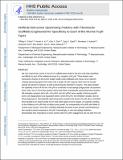| dc.contributor.author | Chen, Tiffany F | |
| dc.contributor.author | Li, Kevin K | |
| dc.contributor.author | Zhu, Eric F | |
| dc.contributor.author | Opel, Cary F | |
| dc.contributor.author | Kauke, Monique J | |
| dc.contributor.author | Kim, Heeyoon | |
| dc.contributor.author | Atolia, Eta | |
| dc.contributor.author | Wittrup, K Dane | |
| dc.date.accessioned | 2021-10-27T20:10:08Z | |
| dc.date.available | 2021-10-27T20:10:08Z | |
| dc.date.issued | 2018 | |
| dc.identifier.uri | https://hdl.handle.net/1721.1/134976 | |
| dc.description.abstract | © 2018 Elsevier Ltd We have engineered a panel of novel Fn3 scaffold-based proteins that bind with high specificity and affinity to each of the individual mouse Fcγ receptors (mFcγR). These binders were expressed as fusions to anti-tumor antigen single-chain antibodies and mouse serum albumin, creating opsonizing agents that invoke only a single mFcγR response rather than the broader activity of natural Fc isotypes, as well as all previously reported Fc mutants. This panel isolated the capability of each of the four mFcγRs to contribute to macrophage phagocytosis of opsonized tumor cells and in vivo tumor growth control with these monospecific opsonizing fusion proteins. All activating receptors (mFcγRI, mFcγRIII, and mFcγRIV) were capable of driving specific tumor cell phagocytosis to an equivalent extent, while mFcγRII, the inhibitory receptor, did not drive phagocytosis. Monospecific opsonizing fusion proteins that bound mFcγRI alone controlled tumor growth to an extent similar to the most active IgG2a murine isotype. As expected, binding to the inhibitory mFcγRII did not delay tumor growth, but unexpectedly, mFcγRIII also failed to control tumor growth. mFcγRIV exhibited detectable but lesser tumor-growth control leading to less overall survival compared to mFcγRI. Interestingly, in vivo macrophage depletion demonstrates their importance in tumor control with mFcγRIV engagement, but not with mFcγRI. This panel of monospecific mFcγR-binding proteins provides a toolkit for isolating the functional effects of each mFcγR in the context of an intact immune system. | |
| dc.language.iso | en | |
| dc.publisher | Elsevier BV | |
| dc.relation.isversionof | 10.1016/J.JMB.2018.04.021 | |
| dc.rights | Creative Commons Attribution-NonCommercial-NoDerivs License | |
| dc.rights.uri | http://creativecommons.org/licenses/by-nc-nd/4.0/ | |
| dc.source | PMC | |
| dc.title | Artificial Anti-Tumor Opsonizing Proteins with Fibronectin Scaffolds Engineered for Specificity to each of the Murine FcγR Types | |
| dc.type | Article | |
| dc.contributor.department | Massachusetts Institute of Technology. Department of Biological Engineering | |
| dc.contributor.department | Massachusetts Institute of Technology. Department of Chemical Engineering | |
| dc.contributor.department | Koch Institute for Integrative Cancer Research at MIT | |
| dc.relation.journal | Journal of Molecular Biology | |
| dc.eprint.version | Author's final manuscript | |
| dc.type.uri | http://purl.org/eprint/type/JournalArticle | |
| eprint.status | http://purl.org/eprint/status/PeerReviewed | |
| dc.date.updated | 2019-09-13T18:38:01Z | |
| dspace.orderedauthors | Chen, TF; Li, KK; Zhu, EF; Opel, CF; Kauke, MJ; Kim, H; Atolia, E; Wittrup, KD | |
| dspace.date.submission | 2019-09-13T18:38:03Z | |
| mit.journal.volume | 430 | |
| mit.journal.issue | 12 | |
| mit.metadata.status | Authority Work and Publication Information Needed | |
